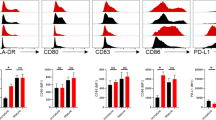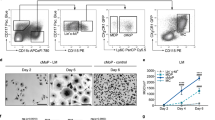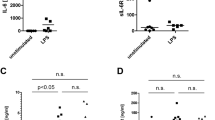Abstract
A role for IgG molecules in the activation of human myelogenous leukemia cells was examined. When added to monoblastic (U937) leukemia cells, mouse (m)IgG1 produced a dose- and time-dependent inhibitory growth effect associated with the induction of morphological features characteristic of macrophage maturation, and enhanced surface expression of Mac-1/CD11b characteristic of monocyte development. A study of isotype dependency of mIg indicated that the effect was specific for Ig molecules of the IgG1 and IgG2b subclasses, whereas IgG2a or IgM had no effect. In parallel to U937 cell maturation, a marked production of latent TGF-β was observed in supernatants of leukemia cells cultured with mIgG1. Myeloblastic (HL-60) leukemia cell line similarly responded to mIgG1 or mIgG2b in induction of macrophage differentiation and in the absence of neutrophil differentiation. Human blood monocytes cultured in the presence of mIgG1, exhibited higher levels of IL-1β and IL-6 mRNAs associated with an increase in protein extracellular release, suggesting that the effect of mIgG1 on IL-1β and IL-6 production in human monocytes was mediated at both transcriptional and post-transcriptional levels. Monocyte activation by mIgG1 and mIgG2b was associated with increased cell surface expression of HLA-DR class II molecules. Human IgG1 (and to a lesser degree hIgG2), was also capable of inducing leukemia cell growth arrest and macrophage maturation whereas F(ab′)2 fragments of mIgG1 were not as efficient as intact mIgG1 in blocking cell growth. Most importantly, mAbs reactive with Fcγ RII (CD32-specific Abs 2E.1 and IV.3) blocked the effects of mIgG1 on leukemia cell proliferation. Taken together, these data indicate that binding of IgG1 molecules, possibly through Fc γ RII, may generate an activation signal towards myelogenous leukemia cells and normal counterpart cells, ie monocytes, leading to induction of macrophage maturation and cytokine secretion.
This is a preview of subscription content, access via your institution
Access options
Subscribe to this journal
Receive 12 print issues and online access
$259.00 per year
only $21.58 per issue
Buy this article
- Purchase on Springer Link
- Instant access to full article PDF
Prices may be subject to local taxes which are calculated during checkout
Similar content being viewed by others
Author information
Authors and Affiliations
Rights and permissions
About this article
Cite this article
Micouin, A., Rouillard, D. & Bauvois, B. Induction of macrophagic differentiation and cytokine secretion by IgG1 molecules in human normal monocytes and myelogenous leukemia cells. Leukemia 11, 552–560 (1997). https://doi.org/10.1038/sj.leu.2400602
Received:
Accepted:
Issue Date:
DOI: https://doi.org/10.1038/sj.leu.2400602



